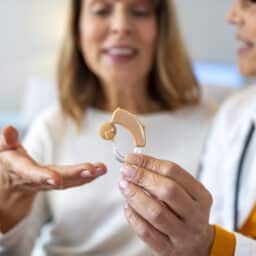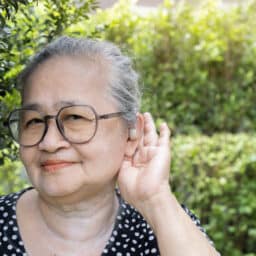New Research Shows Promise in Restoring Auditory Function
According to the World Health Organization, by 2050, 1.5 billion people are expected to have some degree of hearing loss. Many of these cases stem from damage to the delicate inner ear hair cells that transmit sound signals to the brain. When these cells are damaged due to age, noise exposure or illness, they do…
Yard Care and Hearing Protection: What to Know
With falling leaves and winter preparations, autumn is a busy time for lawn care and people don’t often think about the impact the work could have on their hearing. Yard work is a necessary task, and the loud equipment often used, like leaf blowers, lawnmowers or chainsaws, poses risks to your hearing health. Here’s how…
Why Do My Hearing Aids Make My Ears Feel Plugged Up?

Approximately 28.8 million U.S. adults could benefit from hearing aids. These tiny devices collect and amplify speech and surrounding sounds to bring the wearer clear communication and background awareness. Whether you’ve been wearing hearing aids for years or just got your first pair, you may have noticed that your devices can bring on a “plugged…
What to Know About Online Hearing Tests
If you’ve noticed changes in your hearing or are curious about your hearing health, you might think of getting a traditional hearing test. However, many audiologists now offer online hearing tests, allowing you to understand your hearing from the comfort of your home, which could give you tools as you head into a traditional consultation….
The Impact of Chemotherapy on Hearing: Understanding Ototoxicity

Chemotherapy is a common cancer treatment that uses drugs to eliminate cancer cells and prevent tumor growth. While chemotherapy has proven to be a life-saving treatment, it often comes with a range of difficult side effects. You’re likely familiar with the fatigue, nausea and hair loss associated with the treatment but might not have learned…
Tips for Dining out With Hearing Loss

Dining out is a great way to enjoy good food in the company of a few close friends. With hearing loss, however, eating out can quickly turn into a stressful experience. The clatter of dishes, sizzling oil in the kitchen and background chatter can turn an otherwise pleasant conversation into a communication nightmare. Let’s look…
Understanding Hearing Aids and Cochlear Implants: A Guide to Hearing Loss Solutions

Approximately 15% of U.S. adults report some degree of hearing loss. Among the most effective solutions for managing hearing loss are hearing aids and cochlear implants. Although both devices improve hearing clarity and ease, they function differently and are designed for varying degrees and types of hearing loss. What To Know About Cochlear Implants Cochlear…
What Is the Connection Between Arthritis and Hearing Loss

Arthritis, a condition characterized by inflammation in the joints, can have implications beyond joint pain and stiffness. Some studies have shown some forms of arthritis and the medications used to treat them have the potential to cause hearing loss. Effect of Arthritis Medications on Hearing One of the connections between arthritis and hearing loss lies…
Happiness From Hearing Devices
Many scientific studies in the past have confirmed the negative impacts associated with hearing loss: depression, anxiety and social isolation. However, there are positive impacts associated with hearing solutions, as well. A study conducted by the Better Hearing Institute (BHI) supplies overwhelming data about how much of a difference hearing devices can make.1 The study…
Diabetes Diagnosis Connected to Hearing Loss
Diabetes can cause blurry vision, hunger, thirst and fatigue; a lesser-known associated condition is hearing loss. A 2008 study from the National Institute on Deafness and Other Communication Disorders (NIDCD) found hearing loss to be about twice as common in adults with diabetes compared to those without the disease. “Our study found a strong and…
